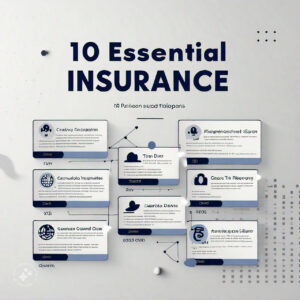Understanding How Long You Should Keep Your Indexed Universal Life Policy
As a savvy investor, you know the importance of a well-balanced portfolio. One of the most popular strategies for long-term financial planning is an indexed universal life policy, or IUL. But how do you know when it’s time to let go of your policy? In this article, we’ll explore what an IUL is and help you determine how long you should keep it.
What is an Indexed Universal Life Policy?
An indexed universal life policy is a type of permanent life insurance that allows you to accumulate cash value while protecting your family in case of your unexpected passing. Unlike a traditional whole life policy, an IUL offers the potential for growth based on the performance of an underlying stock index, such as the S&P 500. This means your policy’s cash value can increase with the market while still guaranteeing a minimum interest rate.
With an IUL, you pay a monthly premium, which is then divided into three parts: the cost of insurance, administrative fees, and the cash value. The cash value can be withdrawn or borrowed against, allowing you to access funds for things like education, retirement, or unexpected expenses.
Factors to Consider When Deciding How Long to Keep an IUL Policy
While an IUL policy can offer many benefits, such as tax-free withdrawals and a death benefit for your beneficiaries, there are several factors to consider when deciding how long to keep your policy.
- Premiums: As with any life insurance policy, premiums can increase over time. It’s important to ensure that your policy remains affordable and within your budget.
- Cash Value: Your IUL policy’s cash value can be accessed through withdrawals or loans. It’s essential to consider whether you need access to those funds now or in the future, and whether the potential growth of your policy outweighs the cost of borrowing against it.
- Health: Your health can change over time, which can impact the cost of your policy. If you’ve experienced significant health changes, it may be worth reassessing whether your IUL policy is still the right fit for your needs.
- Market Performance: While an IUL policy can offer the potential for growth, it’s important to remember that market performance is not guaranteed. You may need to reassess whether the potential for growth outweighs the risks if the market experiences a downturn.
How Long Should You Keep Your IUL Policy?
Ultimately, the decision of how long to keep your IUL policy will depend on your unique circumstances and financial goals. However, there are several things to consider when making this decision:
- Goal: What are you hoping to achieve with your policy? If you’re looking for a long-term investment strategy, an IUL policy may be a good fit.
- Premiums: Can you afford the premiums, both now and in the future? If your premiums become unmanageable, it may be time to let go of your policy.
- Cash Value: Do you need access to your policy’s cash value now or in the near future? If so, it may be worth considering whether the cost of borrowing against your policy outweighs the potential growth.
- Health: Has your health changed significantly since you first purchased your policy? If so, it may be worth reassessing whether your IUL policy is still a good fit for your needs.
- Market Performance: Has the market experienced significant changes? If so, it may be worth reassessing whether the potential for growth outweighs the risks.
Conclusion
Ultimately, the decision of how long to keep your IUL policy will depend on your unique circumstances and financial goals. It’s important to regularly review your policy to ensure it’s still the right fit for your needs, especially if your circumstances have changed. If you decide to let go of your policy, make sure you understand the surrender charges and tax implications. If you’re considering a new policy, make sure you understand the costs, benefits, and potential risks. Working with a financial advisor can help you make an informed decision that aligns with your long-term goals. Remember, an IUL policy can be a valuable part of a balanced financial plan, but it’s not the right choice for everyone. By understanding the factors to consider and regularly reviewing your policy, you can make the best decision for your unique needs.
- “The Top 5 Benefits of Indexed Universal Life Insurance”
- Get the Most Long-Term Protection for Your Money with Indexed Universal Life Insurance (IUL)
- How to enroll in Medicare: a step-by-step guide
- “Understanding Indexed Universal Life Insurance: Risks, Rewards, and Financial Planning”
- The Benefits of Indexed Universal Life Insurance for You and Your Family
[wpaicg_chatgpt]






